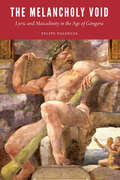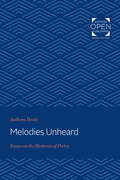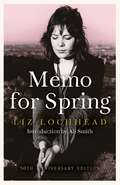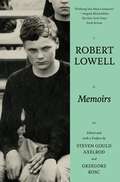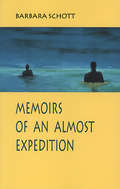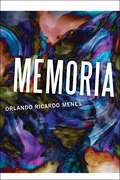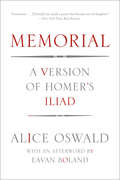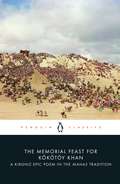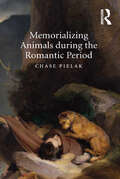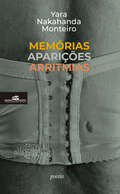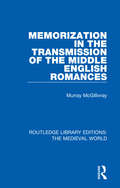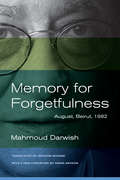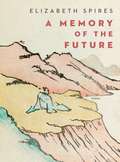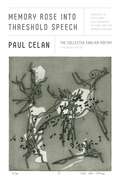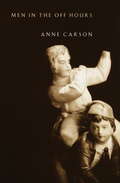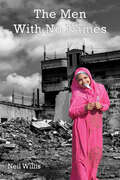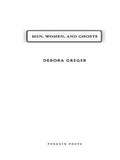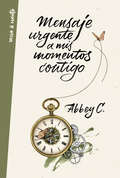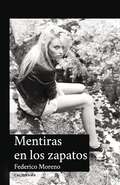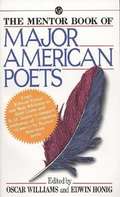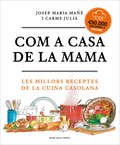- Table View
- List View
The Melancholy Void: Lyric and Masculinity in the Age of Góngora (New Hispanisms)
by Felipe ValenciaAt the turn of the seventeenth century, Spanish lyric underwent a notable development. Several Spanish poets reinvented lyric as a melancholy and masculinist discourse that sang of and perpetrated symbolic violence against the female beloved. This shift emerged in response to the rising prestige and commercial success of the epic and was enabled by the rich discourse on the link between melancholy and creativity in men. In The Melancholy Void Felipe Valencia examines this reconstruction of the lyric in key texts of Spanish poetry from 1580 to 1620. Through a study of canonical and influential texts, such as the major poems by Luis de Góngora and the epic of Alonso de Ercilla, but also lesser-known texts, such as the lyrics by Miguel de Cervantes, The Melancholy Void addresses four understudied problems in the scholarship of early modern Spanish poetry: the use of gender violence in love poetry as a way to construct the masculinity of the poetic speaker; the exploration in Spanish poetry of the link between melancholy and male creativity; the impact of epic on Spanish lyric; and the Spanish contribution to the fledgling theory of the lyric.The Melancholy Void brings poetry and lyric theory to the conversation in full force and develops a distinct argument about the integral role of gender violence in a prominent strand of early modern Spanish lyric that ran from Garcilaso to Góngora and beyond.
Melodies Unheard: Essays on the Mysteries of Poetry (Johns Hopkins: Poetry and Fiction)
by Anthony HechtOriginally published in 2003. The fruit of a lifetime's reading and thinking about literature, its delights and its responsibilities, this book by acclaimed poet and critic Anthony Hecht explores the mysteries of poetry, offering profound insight into poetic form, meter, rhyme, and meaning. Ranging from Renaissance to contemporary poets, Hecht considers the work of Shakespeare, Sidney, and Noel; Housman, Hopkins, Eliot, and Auden; Frost, Bishop, and Wilbur; Amichai, Simic, and Heaney. Stepping back from individual poets, Hecht muses on rhyme and on meter, and also discusses St. Paul's Epistle to the Galatians and Melville's Moby-Dick. Uniting these diverse subjects is Hecht's preoccupation with the careful deployment of words, the richness and versatility of language and of those who use it well.Elegantly written, deeply informed, and intellectually playful, Melodies Unheard confirms Anthony Hecht's reputation as one of our most original and imaginative thinkers on the literary arts.
Melputtur Narayana Bhatta
by C. RajendranMonograph on the great scholar poet of Kerala who is second only to the great Sankaracarya in stature.
Memo for Spring
by Liz LochheadLiz Lochhead is one of the leading poets writing in Britain today. This, her debut collection, published in 1972, was a landmark publication. Writing at a time when the landscape of Scottish poetry was male dominated, hers was a new voice, tackling subjects that resonated with readers – as it still does. Her poetry paved the way, and inspired, countless new voices including Ali Smith, Kathleen Jamie, Jackie Kay and Carol Ann Duffy. Still writing and performing today, fifty years on from her first book of poetry, Liz Lochhead has been awarded the Queen’s Gold Medal for Poetry and was Scotland’s second modern Makar, succeeding Edwin Morgan. Memo for Spring is accessible, vital and always as honest as it is hopeful. Driving through this collection are themes of pain, acceptance, loss and triumph.
Memoirs
by Robert LowellA complete collection of Robert Lowell’s autobiographical prose, from unpublished writings about his youth to reflections on the triumphs and confusions of his adult life.Robert Lowell's Memoirs is an unprecedented literary discovery: the manuscript of Lowell’s lyrical evocation of his childhood, which was written in the 1950s and has remained unpublished until now. Meticulously edited by Steven Gould Axelrod and Grzegorz Kosc, it serves as a precursor or companion to his groundbreaking book of poems Life Studies, which signaled a radically new prose-inflected direction in his work, and indeed in American poetry. Memoirs also includes intense depictions of Lowell’s mental illness and his determined efforts to recover. It concludes with Lowell’s reminiscences of other writers, among them T. S. Eliot, Robert Frost, Ezra Pound, John Berryman, Anne Sexton, Hannah Arendt, and Sylvia Plath. Memoirs demonstrates Lowell’s expansive gifts as a prose stylist and his powers of introspection and observation. It provides striking new evidence of the range and brilliance of Lowell’s achievement.Includes black-and-white photographs
Memoirs of an Almost Expedition
by Barbara SchottIn Memoirs of an Almost Expedition, Barbara Schott peels back the skin of language to reveal its musculature, its bone. She also peels back the skin of relations, the intimate rub of self against self, to find both great longing and great loss. Schott marks how the heart bends to words, bends itself with words, in her poetic "novel" "Archipelago" her marvelous sequence "hymens" and in each discrete poem in this lovely book.
Memoria: Poems
by Orlando Ricardo MenesBorn to Cuban parents in Lima, Perú, raised in Miami among political exiles, and having spent two years in Francoist Spain, Orlando Ricardo Menes pays tribute to the resilience and tradition that shape Hispanic culture across the globe while critiquing the hypermasculine characteristics embedded within. Ripe with pride and shame, beauty and aversion, Memoria relays the personal path one takes while navigating the complexities of heritage. Throughout his life, the ever-present concept of machismo has created turmoil and grief for Menes, who aligns his sensibilities with a more compassionate expression of masculinity. In poems about the Franco dictatorship and the Spanish Civil War, Menes assails the fascists’ preoccupation with violence and domination as tokens of manliness. Meditations on the music of Menes’s youth also underscore a young man’s desire for alternative versions of manhood. Alice Cooper and Lou Reed offer examples of self-liberation from the repressive regime: “Cropped head, whitewashed face, O Lou, our goth-butch apostle / In skintight leather pants, eagle’s-head buckle on a rhinestone belt . . . Our mothers horrified to have borne sons so twisted, so perverse, / Their mop sticks primed to beat us into Marlboro Men.” Menes balances these unflinching criticisms with celebratory lines for España as a mother country: “We . . . sailed in silence on the asphalt currents / to Madrid’s Puerta del Sol, our little car / gliding like a caravel to this Gate of the Sun, / Spain’s navel, point zero, her alpha and omega, / where the empire was born and died, / where every road and every life begins and ends.” Menes’s honest embrace of his heritage includes fond remembrance of his mother, “we talked about your house in / Havana, so close to the bay your young eyes winced / in salt air,” and sincere expressions of cultural reckoning, “Nations die but blood lives forever in la memoria, / So pray to your Abuelo as you would God Himself / Who made earth, sky, and water from the void.” At once rich with sensorial memories and rife with conflicts of identity, Memoria expands representations of Hispanic culture while drawing on universal themes of love, belonging, and rebellion.
Memorial: A Version of Homer's Iliad
by Alice Oswald Eavan Boland"The most remarkable and affecting book of poetry I encountered this year."--James Wood, The New Yorker In this daring new work, the poet Alice Oswald strips away the narrative of the Iliad--the anger of Achilles, the story of Helen--in favor of attending to its atmospheres: the extended similes that bring so much of the natural order into the poem and the corresponding litany of the war-dead, most of whom are little more than names but each of whom lives and dies unforgettably and unforgotten in the copious retrospect of Homer's glance. The resulting poem is a war memorial and a profoundly responsive work that gives new voice to Homer's level-voiced version of the world. Through a mix of narrative and musical repetition, the sequence becomes a meditation on the loss of human life.
The Memorial Feast for Kökötöy Khan: A Kirghiz Epic Poem in the Manas Tradition
by Saghïmbay Orozbaq uuluThis great Central Asian epic, passed down through generations and now brought to life in a new translation, carries the reader into a world of nomads, warriors and horselords'I am a steel-fanged lion, a dragon ready to pounce, a mighty poplar with golden branches rising up to the sky'The bard Saghïmbay Orozbaq uulu composed his oral telling of the great Central Asian Manas epic in the early twentieth century, although it draws on far older sources. This vivid episode from his narrative tells the bravura story of an uncertain new khan, Boqmurun, who holds a great feast to commemorate his predecessor, Kökötöy. From east and west, warriors and their turbulent retinues come to compete in horse races, jousting and wrestling, and soon insults are hurled and scores settled violently. Yet none can beat the supreme hero, the mighty, truculent Manas. By turns earthy, stirring, bombastic and funny, Saghïmbay's work stands as a monument to the oral culture of a nomadic people.Daniel Prior's landmark translation includes a 'How to Read the Epic' section, commentary, maps and illustrations.Composed in oral performance by Saghïmbay Orozbaq uulu Translated by Daniel Prior
Memorializing Animals during the Romantic Period
by Chase PielakEarly nineteenth-century British literature is overpopulated with images of dead and deadly animals, as Chase Pielak observes in his study of animal encounters in the works of Charles and Mary Lamb, John Clare, Samuel Taylor Coleridge, Lord Byron, and William Wordsworth. These encounters, Pielak suggests, coincide with anxieties over living alongside both animals and cemeteries in the late eighteenth and early nineteenth-centuries. Pielak traces the linguistic, physical, and psychological interruptions occasioned by animal encounters from the heart of communal life, the table, to the countryside, and finally into and beyond the wild cemetery. He argues that Romantic period writers use language that ultimately betrays itself in beastly disruptions exposing anxiety over what it means to be human, what happens at death, the consequences of living together, and the significance of being remembered. Extending his discussion past an emphasis on animal rights to an examination of animals in their social context, Pielak shows that these animal representations are both inherently important and a foreshadowing of the ways we continue to need images of dead and deadly Romantic beasts.
Memórias aparições arritmias
by Yara Nakahanda MonteiroO primeiro livro de poesia de Yara Nakahanda Monteiro tem passado e futuro, memórias e sonhos. «Eis uma nova voz que importa descobrir - e que veio para ficar.» José Eduardo Agualusa «Trineta da escravatura, bisneta da mestiçagem, neta da independência e filha da diáspora», Yara Nakahanda Monteiro (Huambo, 1979) estreia-se na poesia com um registo íntimo, tateando nas palavras a essência da condição feminina, da natureza, da identidade e da pertença, das memórias e dos sonhos. Tranço o cabelo dizem quero parecer mais preta Faço brushing dizem quero parecer mais branca Na frente quente vinda do hemisfério sul os caracóis secam desordenados perguntam quero parecer de onde? "Eu sou de onde estou." Os seus poemas transportam-nos para outros tempos e espaços: o da infância e adolescência na periferia de Lisboa; o das histórias da vida em Angola, contadas pela avó. Neles brotam desassossegos rabiscados em cadernos, esboçam-se trilhos imaginados a partir das grandes questões que definem quem somos. A meio caminho, corre a vida de todos os dias e surge uma voz literária envolvente, encantatória, impossível de ignorar. Qualquer ressonância com a realidade é poesia. Sobre Memórias Aparições Arritmias: «Herdeira de uma tradição lírica (oral e erudita) que não renega, Yara Nakahanda Monteiro traz para a poesia angolana os grandes temas de um presente em convulsão. Eis uma nova voz que importa descobrir - e que veio para ficar.» José Eduardo Agualusa «A mão delicada tece as veias da vida como linhas de bordar e palavras na boca das mais velhas. Há meninas assim: ficam sentadas na esquina dos dias só para amansar os ventos, cuidar das chuvas e rodar as flores no sentido do sol. Esperam. A cidade cede a mil noites de calor e insetos sem o sono da fartura nem a quietude dos pássaros. As mulheres preparam o milho do dia seguinte e calam a água e as sementes do riso. Não dormem. Esperam. Entre grito e silêncio, a voz das mulheres gravada na memória da cidade e há tanto tempo esquecida surge assim nestas aparições. Yara Monteiro juntou, deu a volta e escreveu. Nada do que aqui está é simples. Tudo tem corpo e vida e está purificado pelo fogo.»Ana Paula Tavares
Memorization in the Transmission of the Middle English Romances (Routledge Library Editions: The Medieval World #34)
by Murray McGillivrayOriginally published in 1990, Memorization in the Transmission of the Middle English Romances tackles the long-standing issue of the role of memorization in the transmission of Middle English romances. The book addresses the lack of consensus on the issue, despite extensive discussion, putting forth the theory that the heterogeneity of the poems of this period, grouped under the general heading of ‘medieval romance’, makes generalizations about the history of transmissions unreliable. The book suggests that oral-formulaic theory has been applied over-literally to oral or oral derived works, through the assumption that all poems answer the same structural criteria. The book also looks at the aspects of orality and performance theory alongside the textuality and intertextuality of these medieval texts.
Memory for Forgetfulness
by Ibrahim Muhawi Sinan Antoon Mahmoud DarwishOne of the Arab world's greatest poets uses the 1982 Israeli invasion of Lebanon and the shelling of Beirut as the setting for this sequence of prose poems. Mahmoud Darwish vividly recreates the sights and sounds of a city under terrible siege. As fighter jets scream overhead, he explores the war-ravaged streets of Beirut on August 6th (Hiroshima Day). Memory for Forgetfulness is an extended reflection on the invasion and its political and historical dimensions. It is also a journey into personal and collective memory. What is the meaning of exile? What is the role of the writer in time of war? What is the relationship of writing (memory) to history (forgetfulness)? In raising these questions, Darwish implicitly connects writing, homeland, meaning, and resistance in an ironic, condensed work that combines wit with rage. Ibrahim Muhawi's translation beautifully renders Darwish's testament to the heroism of a people under siege, and to Palestinian creativity and continuity. Sinan Antoon's foreword, written expressly for this edition, sets Darwish's work in the context of changes in the Middle East in the past thirty years.
Memory in Vergil's Aeneid
by Aaron M. SeiderTracing the path from Troy's destruction to Rome's foundation, the Aeneid explores the transition between past and future. As the Trojans struggle to found a new city and the narrator sings of his audience's often-painful history, memory becomes intertwined with a crucial leitmotif: the challenge of being part of a group that survives violence and destruction only to face the daunting task of remembering what was lost. This book offers a new reading of the Aeneid that engages with critical work on memory and questions the prevailing view that Aeneas must forget his disastrous history in order to escape from a cycle of loss. Considering crucial scenes such as Aeneas' reconstruction of Celaeno's prophecy and his slaying of Turnus, this book demonstrates that memory in the Aeneid is a reconstructive and dynamic process, one that offers a social and narrative mechanism for integrating a traumatic past with an uncertain future.
A Memory of the Future: Poems
by Elizabeth SpiresZen-infused meditations on the limitations of memory, mortality, and the boundaries of human existence. In A Memory of the Future, critically acclaimed poet Elizabeth Spires reflects on selfhood and the search for a core identity. Inspired by the tradition of poetic interest in Zen, Spires explores the noisy space of the mind, interrogating the necessary divide between the social persona that navigates the world and the artist’s secret self. With vivid, careful attention to the minute details of everyday moments, A Memory of the Future observes, questions, and meditates on the ordinary, attempting to make sense of the boundaries of existence. As the poems move from Zen reflections outward into the identifiable worlds of Manhattan, Maine, and Maryland’s Eastern shore, houses, both real and imagined, become metaphorical extensions of the self and psyche. These poems ask the unanswerable questions that become more pressing in the second half of life. How are we changed by the passage of time? How does memory define and shape us? As Spires reminds us, any memory of the future will become, paradoxically, a memory of the past, and of forgetting.
Memory Rose into Threshold Speech: The Collected Earlier Poetry: A Bilingual Edition
by Paul CelanMemory Rose into Threshold Speech gathers the poet Paul Celan's first four books, written between 1952 and 1963, which established his reputation as the major post-World War II German-language poet.Celan, a Bukovinian Jew who lived through the Holocaust, created work that displays both great lyric power and an uncanny ability to pinpoint totalitarian cultural and political tendencies. His quest, however, is not only reflective: there is in Celan's writing a profound need and desire to create a new, inhabitable world and a new language for it. In Memory Rose into Threshold Speech, Celan’s reader witnesses his poetry, which starts lush with surrealistic imagery, become gradually pared down; its syntax tightens and his trademark neologisms and word formations increase toward a polysemic language of great accuracy that tries, in the poet's own words, "to measure the area of the given and the possible."Translated by the prize-winning poet and translator Pierre Joris, this bilingual edition follows the 2014 publication of Breathturn into Timestead, Celan's collected later poetry. All nine volumes of Celan's poetry are now available in Joris's carefully crafted translations, accompanied here by a new introduction and extensive commentary. The four volumes in this edition show the flowering of one of the major literary figures of the last century.This volume collects Celan’s first four books: Mohn und Gedächtnis (Poppy and Memory), Von Schwelle zu Schwelle (Threshold to Threshold), Sprachgitter (Speechgrille), and Die Niemandsrose (NoOnesRose).
Men in the Off Hours
by Anne CarsonFollowing her widely acclaimed Autobiography of Red ("A spellbinding achievement" --Susan Sontag), a new collection of poetry and prose that displays Anne Carson's signature mixture of opposites--the classic and the modern, cinema and print, narrative and verse.In Men in the Off Hours, Carson reinvents figures as diverse as Oedipus, Emily Dickinson, and Audubon. She views the writings of Sappho, St. Augustine, and Catullus through a modern lens. She sets up startling juxtapositions (Lazarus among video paraphernalia; Virginia Woolf and Thucydides discussing war). And in a final prose poem, she meditates on the recent death of her mother. With its quiet, acute spirituality, its fearless wit and sensuality, and its joyful understanding that "the fact of the matter for humans is imperfection," Men in the Off Hours shows us "the most exciting poet writing in English today" (Michael Ondaatje) at her best.From the Hardcover edition.
The Men With No Names
by Neil WillisPeople of the world all look to find their own position; firstly through family and friends, then the neighbourhood and finally work. Others prefer the commune of religion. All these influence the way they live and think, which in turn, allows them to find a cause close to our heart. But give people a democracy and you allow them to bloom, not just in their cause, but rendering them more freedom of thought. What could be better? The Men With No Names follows democracy in an insular town in Britain. This allows each person to have their opinion or put forward their own cause towards their fellow neighbours, as well as suggesting or rejecting ideas by the town mayor and council. Looking at the town’s folk from afar is one man who has seen the world and has his quiet opinions, also influenced by his own experiences of war, but far beyond what he had expected. The book looks at past history that repeats through each generation, the struggles of the people to find who they are, and finally, to who are the heroes in our world, and those who think they are heroic in their cause. There is always more to learn, but the main concern is that most people only use the narrow mind that they know.
Men, Women, and Ghosts
by Debora GregerNew from Debora Greger??a special poet in every sense? (Poetry)In her eighth book of poetry, Debora Greger travels not just the present but the past, looking for some strange place to call home. She takes a taxi to Stonehenge. She writes letters to Li Po and Tu Fu, Shakespeare and Jane Austen, always seeking out the beast that is man and the beast that is woman. She explores both the remoteness of the past (those radioactive fifties that were her childhood), and the weight of it?or, better, the responsibility of it. These modern traveler?s tales?musing, insistent, marvelous?place one woman?s collection of pasts into a world inhabited by Horace, Chekhov, the bank vault of England, and the giant octopus of Puget Sound.
Mensaje urgente a mis momentos contigo
by Abbey CLa exitosa Youtuber Abbey C., La chica del andén, nos descubre la historia de cada instante, de cada uno de los momentos que cuentan una historia de amor. Esto no es un libro, es una recopilación de sentimientos: la pereza de los domingos, la rabia de los lunes, la resurrección de los martes; cómo te vi por primera vez en invierno, cómo nos enamoramos en primavera, cómo te despedí en el último otoño... Esto no es un libro, son las páginas donde vas a encontrarte. Las páginas que cuentan mi historia y también la tuya, un mensaje urgente a los momentos que nos recuerdan que todos nosotros, alguna vez, nos hemos estrujado el corazón hasta vaciarlo. Los lectores dicen...«Mensaje urgente a mis momentos contigo es un libro optimista, un libro en el que Abbey C. se desnuda y nos muestra sin tapujos sus sentimientos. Lo que más me ha gustado es el mensaje positivo que siempre se puede extraer de sus textos y eso es algo que valoro mucho.»Blog Libros y literatura
Mental Fight: An Epic Poem
by Ben OkriAn epic poem touching on issues of racism, intolerance, and environmental destruction, from the Booker Prize–winning author.There is much to celebrate in the human journey so far—art in all its forms, advances made in the fields of technology and medicine, and for many of us, the miracle of freedom. But there is also much to regret—racism, intolerance, the destruction of our environment, the reality and the legacy of slavery. In this long, sustained consideration of the state we find ourselves in, Ben Okri invokes the past to explain the present, and sings out a message of hope. The future is still ours to make.This epic poem, an anthem for the twenty-first century, first appeared in The Times in January 1999. Its message could hardly be more relevant to our present condition. Discover this revised edition of an inspiring and extraordinarily tender work.
Mentiras en los zapatos
by Federico Moreno«Cuántos temblores, frenesí y amores pensando convencidos que a alguien le importaban». A veces, es la vida misma quien compone versos para nosotros. Es la vida la que, en ocasiones, entre sus páginas negras escritas con la punta de un cuchillo, susurra poemas y nos deleita con los cabellos al viento, los labios escarchados por el deseo, los secretos de unos ojos que nos miran o los perfumes de otros poemas. De saber mirar y saber contar lo que se mira, de estar abierto al mundo, de ser tierra que extiende los brazos ante nuevos abonos... De las miserias y las bellezas, de las bofetadas y de los besos de los días. De la vida. De todo esto da cuenta Federico en su segundo poemario y nos recuerda que la poesía no solo se encuentra en las páginas de un libro.
The Mentor Book of Major American Poets
by Oscar Williams Edwin HonigA compact anthology of 3 centuries of poetry by 20 great American poets.
Mentre perds el mon de vista
by Dolo BeltránLa cantant i actriu Dolo Beltran, s'aventura a narrar-nos una història personal i íntima, feta d'imatges a llapis, poesia i petits epissodis que formen una vida. Amb il·lustracions de Dolo Beltran «I si miréssim un àlbum de fotos i tots els moments que hi ha immortalitzats es convertissin en poesia? Una manera rítmica i romàntica d'explicar una història. Poesia feta d'imatges, de moments viscuts, flaixos d'una vida. He volgut aventurar-me a descobrir quina història pot explicar un simple àlbum. Un àlbum que podria pertànyer a qualsevol persona que, metòdicament, hi ha anat enganxant fotografies... Perquè hi ha alguna cosa estranya quan observes les fotos i veus tota aquella gent mirant a càmera, intentant immortalitzar el moment, com si perdessin el món de vista. I de cop, quan sona el clic de l'aparell, no hi ha passat ni futur... només la necessitat que aquell moment duri per sempre.»Dolo Beltran
